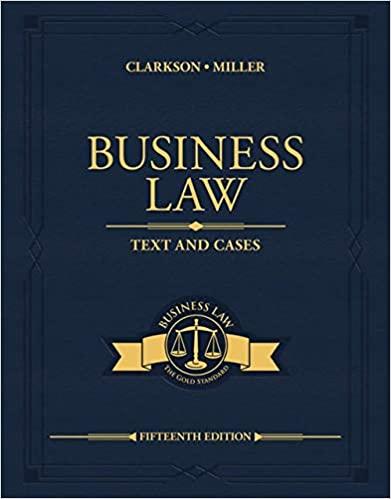Question
Bill underwent a surgical procedure performed by Dr. Ted to implant a device that Dr. Ted told Bill will prevent the forming blood clots in
Bill underwent a surgical procedure performed by Dr. Ted to implant a device that Dr. Ted told Bill will prevent the forming blood clots in one his narrowed arteries. Dr. Ted told Bill he had previous success with the device and believed it would help prevent a clot in his artery. Dr. Ted was an experienced surgeon and had used the device in previous procedures. The surgery was successful, however, five (5) months later, Bill suffered a stroke caused by a blood clot in the artery containing the device.
The device was made by Health Solutions Lab (HSL) and was one of the most popular medical devices that it made, marketed, and sold. On the HSL website the device is highlighted, and contained statements about the device, such as "trusted performance", "proven design and stability ", "time tested design". Additionally, HSL provides a brochure to its medical providers that are considering using the device which contains the same language, and some additional statements, such as "the most trusted in the industry". Dr. Ted received and read one of these brochures.
Bill has now filed a claim for damages for fraudulent misrepresentation by HSL.
For this discussion's initial post:
- Discuss whether you think HSL fraudulently induced Bill into undergoing the surgical procedure.
- Do you think Dr. Ted fraudulently induced Bill into undergoing the procedure?
- Explain your answers and be sure to include analysis of the elements of fraudulent misrepresentation.
PlEASE GIVE ME FEEDBACK ON THIS DISCUSSION
A. DISCUSS WHETHER YOU THINK HSL FRAUDULENTLY INDUCED BILL INTO UNDERGOING THE SURGICAL PROCEDURE
It is difficult to definitively conclude that HSL fraudulently induced Bill into undergoing the surgical procedure because of absence of specific claims. HSL makes broad, imprecise claims on its website and brochure. They don't contain the precise information on avoiding blood clots required to be considered actionable misrepresentation. Without more proof, it is also difficult to show that HSL knew about the limitations of the gadget or that they intended to mislead Bill. For this factor to be supported, there would need to be evidence of HSL hiding negative data, expert testimony or internal papers. It is dubious that Bill relies so heavily on HSL's promotional materials. As a patient he probably trusted Dr. Ted's advice and medical knowledge more, so its hard to argue that he relied on HSL's broad marketing claim.
ELEMENTS OF FRAUDULENT MISREPRESENTATION
Desire to mislead: Here, it is challenging to determine intent. HSL may be sincere in their belief in this success rate, or they may be purposefully inflating it to draw in clients.
Justifiable reliance: It is difficult to determine if Bill fairly relied on HSL's advertisement without knowing about his understanding of the process and available alternatives.
Falsehood: HSL touted a 98% success rate for the procedure. This figure may constitute a serious mis-statement if it is noticeable inflated or misleading.
B. Do you think Dr. TED fraudulently induced Bill into undergoing the procedure?
Compared to HSL's generic marketing language, Dr. Ted's assertions regarding the device's ability to prevent blood clots and his own conviction in its efficacy are more focused. These remarks have a greater impact on Bill's choice. Dr Ted's remarks would be viewed as irresponsible if he was not aware of any possible dangers or equipment limits. Additionally, his intention to deceive becomes more credible if he had access to studies or facts that refuted his affirmative statements. Also, because Dr Ted was Bill's physician and a respected authority, Bill had a good reason to rely on his advice. This makes a potential claim's element of dependence stronger.
ELEMENTS OF FRAUDULENT MISREPRESENTATION
Falsehood:We are unaware of the precise details of what Dr. Ted told Bill in person. He might have committed deception if he had said something untrue or deceptive regarding the advantages, hazards, or available alternatives to the procedure. Like HSL, it is uncertain if Dr. Ted intended to mislead. He might have been sincere in what he said, or he might have lied to Bill on purpose to get his approval.
Justifiable reliance: When making his choice, Bill probably gave Dr. Ted knowledge of lot of weight. In order to determine justified reliance, it would be imperative to examine the doctor-patient relationship and the information that Dr. Ted gave. Similar to HSL, Bills account of difficulties or unfavorable results would support this element.
Step by Step Solution
There are 3 Steps involved in it
Step: 1

Get Instant Access to Expert-Tailored Solutions
See step-by-step solutions with expert insights and AI powered tools for academic success
Step: 2

Step: 3

Ace Your Homework with AI
Get the answers you need in no time with our AI-driven, step-by-step assistance
Get Started


